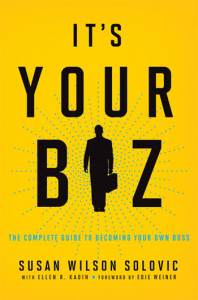It’s Your Biz – Real World Tips for Building a Business
The leap from employee to entrepreneur is fraught with risks and uncertainties. And every day, newly-minted entrepreneurs charge into the startup world with little appreciation for what that may entail. As a result, many end up wasting tremendous time reinventing the wheel. Worse yet, they make easily avoided fatal mistakes and compound the statistic of startup failures.
There are plenty of books that tell entrepreneurs to “pursue your passion” and “chase your dreams” but relatively few that delve into the practical nuts-and-bolts of building a profitable enterprise. In the New York Times and Wall Street Journal bestseller It’s Your Biz: The Complete Guide to Becoming Your Own Boss, author Susan Wilson Solovic recounts key lessons learned through years of running and working with small businesses.
Here are some of her words of wisdom for those considering or already running their own small business:
- Be introspective and keep moving forward. Stay aware of what you are working on. It’s easy to stay busy and not accomplish anything because you end up focusing on things that don’t matter. Set key business goals and develop a plan for achieving those goals. Your plan should translate to measurable milestones. Spend time each day working towards achieving these milestones, and regularly measure progress. In every activity, ask yourself if it moves you closer to your goal. If not, it’s probably just a distraction.
- Listen to your instincts. Guidance from mentors and advisers is usually helpful, but if your gut tells you otherwise, take a step back and review the situation more closely before choosing a path. Your strategy is ultimately your own responsibility; you can’t rely on somebody else’s strategy. Even a GPS is wrong sometimes, and if your gut tells you something’s wrong, listen to it!
- Focus on controlled growth. It’s very tempting to grow quickly, but you need to think of your business as a marathon and not as a sprint. Pace yourself. You have limited resources, and you have to carefully choose which opportunities you can pursue given what you have available. Remember, according to Seth Godin, “it takes about six years of hard work to become an overnight success.”
- Forge alliances. It’s tough to go it alone. Strategic partnerships enable you to pursue bigger contracts, expand your service offering, and have a larger geographic footprint. You may also learn some best practices from an established partner. Finally, it’s helpful to have an ally in your industry to collaborative with when thinking through novel ideas.
- Prepare for the unexpected. Murphy’s Law seems to strike startups more often than others. Make sure that you have a disaster plan so you can survive massive disruptions like power failures, system outages, and natural disasters. Your plan should include a list of the essentials for keeping your business running; contact lists of employees, customers, suppliers, and service providers; off-site backups of critical documents; appropriate insurance coverage; and physical emergency supplies. For more tips on startup risk management techniques, see What Kills Startups.
- Manage your stress. Few things are more stressful than starting and growing a business, and stress is a leading cause of illness in this country. Avoid over-commitment by learning to say (and mean) No, or you will burn yourself out. Make time every week for quality time with family and friends, and be sure to exercise and eat well. For inspiration, see my article Fit to Be an Entrepreneur: 12 Fitness Tips.
Finally, be sure your business is founded on the cornerstones of purpose, promise, and principles. If you don’t keep your “big picture” clear in your mind, it’s too easy to become a zombie, going through the motions.
Solovic says “Businesses without a purpose don’t have a heart. They don’t stand for anything, and as a result, they don’t stand out from similar businesses.” When you stand out, you can develop and deliver on a unique promise to customers. And you can deliver on your promise by staying true to your principles, just as Apple did by focusing on the principles of innovation, efficiency, and quality.

